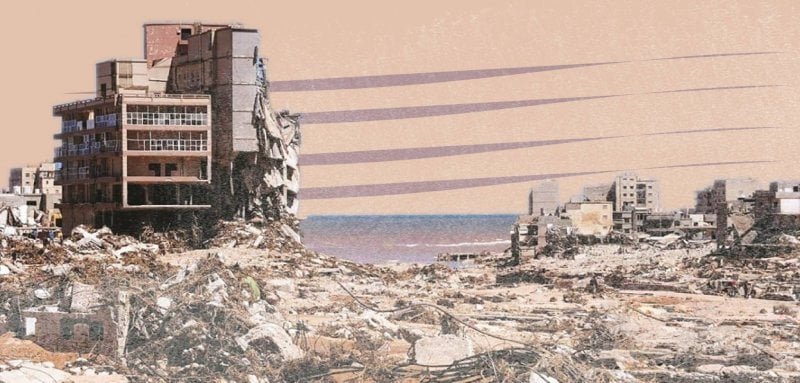In September 2023, Storm Daniel, Africa's deadliest storm in recorded history, struck the southeast coast of the Mediterranean Sea, resulting in a violent environmental and humanitarian crisis in Derna, Libya. The devastating storm left behind thousands of victims and missing persons, most of them Libyans along with a considerable number of Egyptians.
At that time, Raseef22 investigated the large presence of Egyptians among the missing and victims, noting that many of them hailed from some of the poorest provinces, centers, and villages in Egypt. The residents of these areas resorted to work in nearby Libya, in the face of scarce job opportunities and declining incomes in their villages and governorates.
They came from Syria, Egypt, and Sudan, driven by economic conditions to seek a better life in Derna, Libya. Then the storm came, leaving families in a state of loss and confusion, with hearts hanging on the hope of reunion
More than three months have passed since the hurricane, and since Egypt pledged to intensify cooperation with Libyan authorities and relevant international institutions and organizations to search for those still missing, estimated by the Egyptian Minister of Immigration to be around 291. He believes that the number is higher, as most Egyptian workers in Libya travel in without obtaining work permits from Egyptian authorities.
But in the three months since the cyclone, families in Egypt are still searching for their missing relatives. So are the families of the missing persons from Sudan and Syria. For many of these victims, Derna was the chosen place to make a living.
Raseef22 contacted the families of several victims in Egypt, Libya, Syria and Sudan, as they still wait for news about their missing loved ones.
Three months since the storm, families Egypt, Sudan and Syria are still searching for their missing relatives. For many, Derna became many families’ chosen destination for a better life.
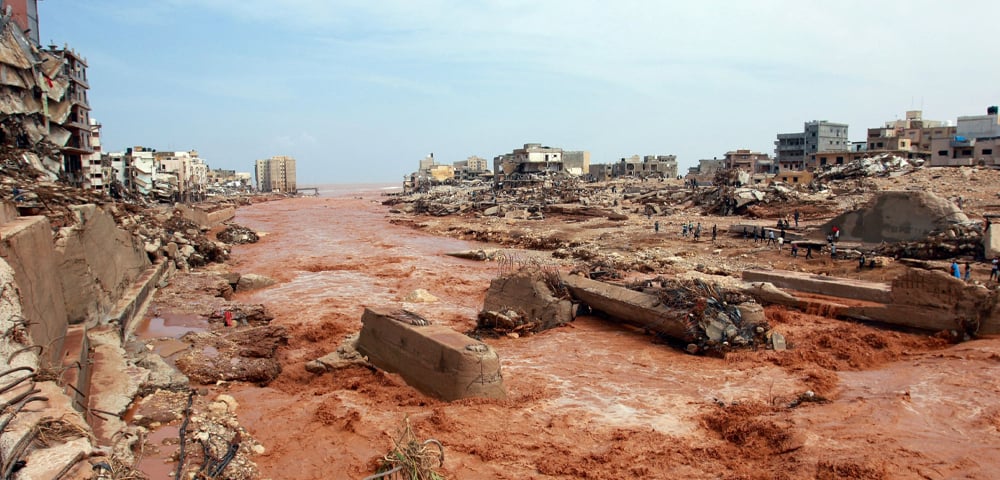 The aftermath of Storm Daniel
The aftermath of Storm Daniel
A short work trip that ended in loss
Mohamed Ismail worked as a baker in Derna, he settled there eleven months before the storm struck. Ismail worked on al-Bahr street, overlooking the sea, and he enjoy the view everyday, unaware that it would tear him away from his loved ones.
During his time in Derna, Mohamed contacted his wife and children daily to check on their well-being. His children were overjoyed when he told them that he would return to Egypt for good the following month, regardless of any financial obstacles, repeating, “I have repented; I will never travel ever again and live far from you,” his wife, Moshira Magdy, tells us. She explains, “We were married ten years ago and had our three children. Our difficult living conditions prompted him to travel to Libya despite being attached to us, but he was determined to return to Egypt after saving some money.”
Moshira recalls the details of the last conversation between her and her husband before his disappearance on September 10 last year, “He sent me a video of the flooded streets and said, ‘I’m going to change my wet clothes and call you in 10 minutes’.” She adds, “Since then, I have been trying to contact him to no avail.”
15 other men from the same village as Mohamed remain missing.
Raseef22 investigated the large presence of Egyptians among the missing people and victims of Storm Daniel. Many came to Libya from some of the poorest villages in Egypt in search of opportunity.
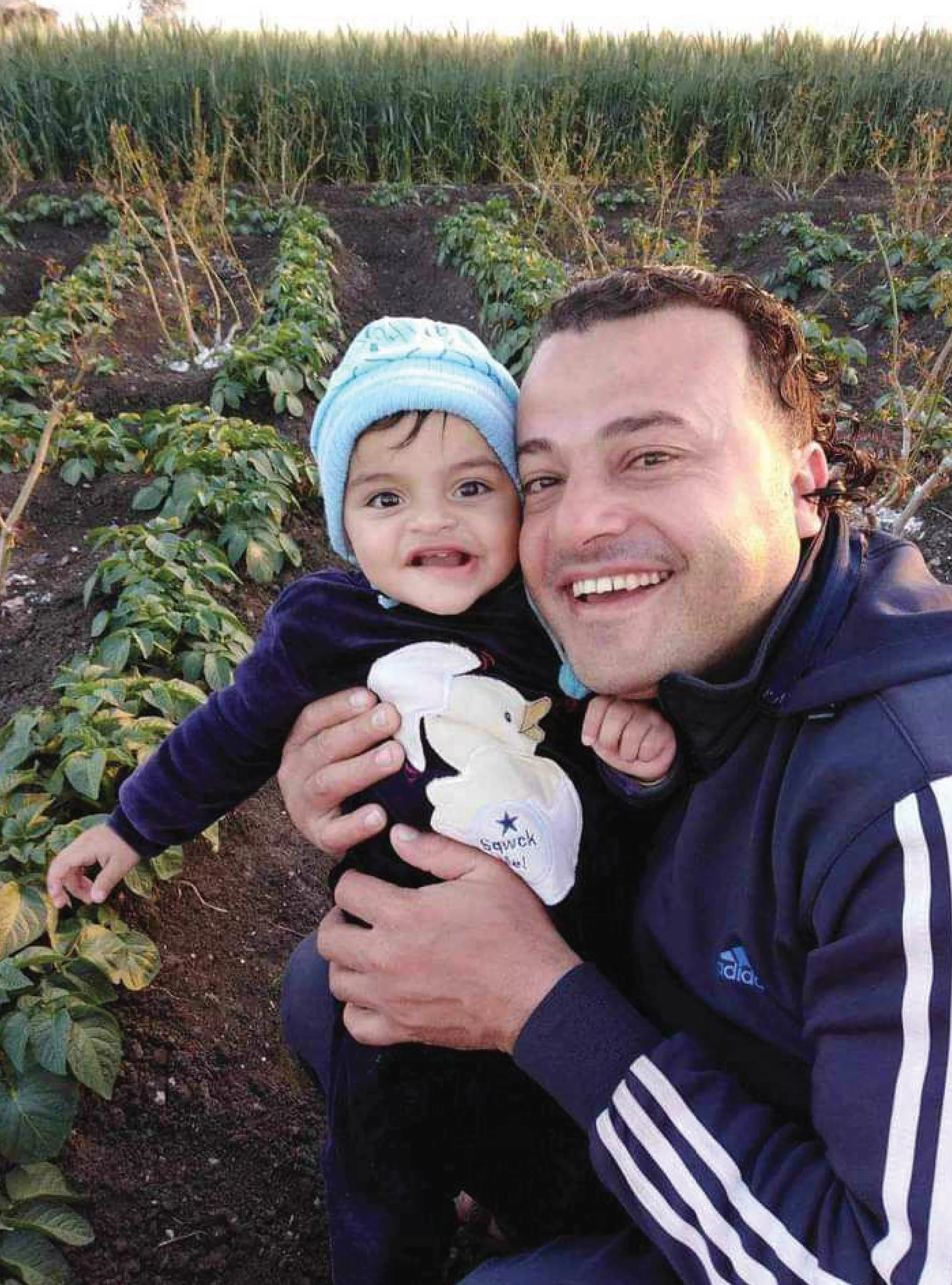 Mohamed Ismail, one of the missing in Storm Daniel
Mohamed Ismail, one of the missing in Storm Daniel
Moshira contacted the Egyptian Red Crescent for information about her husband, to no avail. She shares, “I want reassurance about my husband. I want to know if he is alive or dead. Even if he returns with memory loss, speech impairment, or paralyzed, I will take care of my family.”
The family of Hazem Sayed, 27, a graduate of the Faculty of Sharia and Law at Al-Azhar University, also await his return home, to Manfalut in the southern governorate of Assiut. After he graduated and his wife, Norhan Abdullah, gave birth to a daughter last June, Sayed traveled to Libya settling in Derna, where he worked selling fruit and vegetables.
Just hours before the building he was living in sank (which his wife learnt through pictures), Sayed contacted his wife, checking in on her and their baby daughter. She did not know that this would be the last time she would see or hear from him. Abdullah tells Raseef22 that Sayed had traveled to Libya three months prior to the storm, where he opened a small shop selling fruit and vegetables in the Derna souk, saying, “It was a good opportunity to make a livelihood.”
The kind and quiet life of Qalaji began in Syria and withstood 13 years of political and security upheaval in Libya since the revolution in 2011. However, he did not survive Storm Daniel.
Abdullah last spoke with her husband during the peak of the storm, in the early hours of September 11, explaining, “I tried to contact him after hearing the news of the collapse of the dams in Derna, but all my calls were in vain. I haven't left any means of communication with a responsible party in Egypt and Libya, and so far I haven't received any news to ease or calm my heart.”
Sole survivor
In 2000, Mohamed Firas Qalaji packed his belongings and left Syria for Libya in search of better professional opportunities. He worked in car maintenance, remaining in constant contact with his family until he returned to his hometown, Damascus, to marry Rana Al-Khatib in 2005 and start a family after his financial situation stabilized.
It was as if his heart was telling him that his death was near. Just three hours before the hurricane, Mohamed called his mother and sister and informed them of his plans to send money to buy a new home for him and his family in Syria, but fate had other plans
Qalaji remained keen to help his family as much as possible, prioritizing his siblings and children. He and his wife had 6 children, ranging from 16 years old to 8 months old.
The kind and humble life of Qalaji, which began in Syria and withstood the political and security upheaval in Libya over 13 years since the Libyan revolution in 2011, did not withstand Storm Daniel.
On the day of the hurricane, Qalaji, in his early forties, and his daughter Jana, 12, died. His wife and five of his children remain missing. Only his brother, Shadi, who worked with him, survived.
"On the day of the hurricane, after the rain subsided, we returned to the ground floor apartment to grab some belongings, but the floods poured in. The doors flung open, water engulfed us and I lost consciousness. If it weren't for my friend, I would've died"
Just three hours before the hurricane, Mohamed Qalaji made a video call to his mother and sister. He told his brother, Khair, who spoke to Raseef22, of his desire to send money for a new home for him and his family in Syria, but fate had other plans, and he lost all his possessions in the flood.
Five years ago, Shadi Qalaji, 38, traveled to join his older brother in Libya and work with him in car maintenance.
Shadi tells us about his brother’s final hours, “A few hours before the disaster, the Libyan authorities warned residents of Al-Bahr of an upcoming storm and the possibility of rising seawater, and asked people to evacuate their homes. On the day of the hurricane, after the rain eased a bit, we went up to our neighbors on the first floor of the building. We then returned to my brother's apartment on the ground floor to grab some belongings, but the floods rushed us. The doors suddenly flung open, water engulfed us, and I lost consciousness. If it weren't for my friend's aid, I would have been among the dead for sure.”
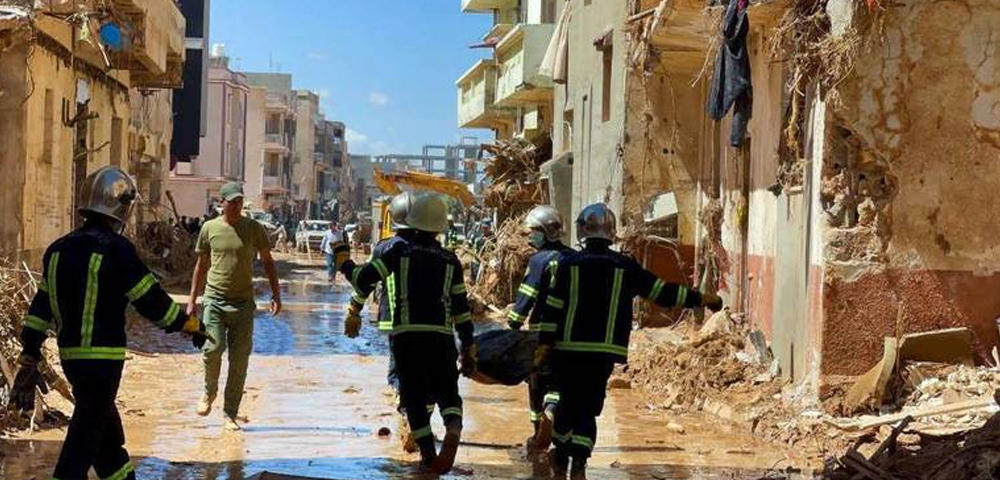 The aftermath of Storm Daniel
The aftermath of Storm Daniel
Nightmares haunt me
Shadi adds, “We found my brother dead in the building's courtyard, and we found the body of his 12-year-old daughter Jana in one of the hospitals in Derna. She was buried, along with her father, in one of the mass graves in Libya. As for my brother's wife and their five children, they were on the roof of the building, and the flood swept them away. Until now, we have not found a single one of them.”
Shadi's life was turned upside down after the incident, “My life is completely destroyed. I lost my older brother, who was like my father, and his family. Nightmares haunt me. Our last moments together will never leave my mind. I am stuck in Derna, as I do not have identification papers or money, since I lost everything in the storm. I cannot leave the city, and I cannot go to other parts of Libya or travel abroad.”
"We found my brother dead in the building, and the body of his 12-year-old daughter Jana nearby. They were buried in a mass grave. As for his wife and five children, they were swept away from the building’s rooftop. Until now, we have yet to find any of them"
Back home in Syria, the grandmother received the news of her son and granddaughter’s deaths with tears, losing consciousness from the shock. Qalaji’s family held a large mourning ceremony. Three months on, Mohamed's mother still cries and prays, clinging to hope of finding the remaining members of her son's family alive.
It's all gone
43 years ago, in 1980, Mudathir Siddiq, 68, immigrated from Sudan to Libya in search of a living. He was 25 years old at the time.
He got married in 1984 and had five children, the oldest is 33 years old and the youngest 21. Two of his children lived with him and their mother in Libya, another lives in Saudi Arabia, and two others were in Sudan.
Siddiq’s three surviving children lost their father, mother, and their brother Mohammed, 24, to Storm Daniel. Only the body of their brother Firas was found. Those of their parents and Mohammed remain missing.
Mudathir Siddiq’s younger brother, Al-Muzzammil, tells Raseef22, “At the beginning of my brother's stay in Libya, he worked in public facilities for civil works in Derna, then retired to work with the Libyan Red Crescent before completely retiring at the age of 64. He was attached to Libya, deciding to stay there, but once he changed his mind, fate did not give him the opportunity to return to Sudan.”
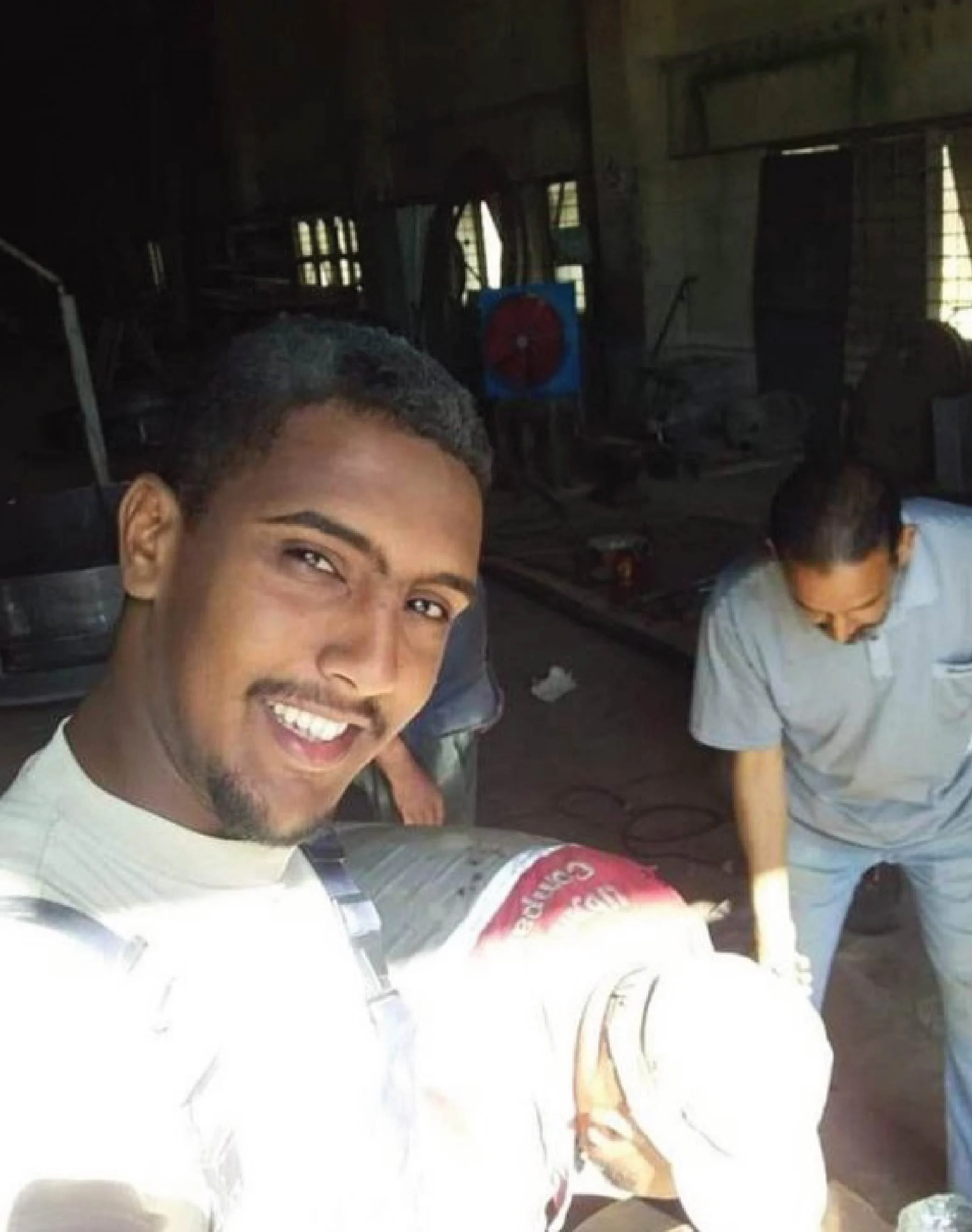 Firas, the only member of his family who was found after they all drowned in the floods
Firas, the only member of his family who was found after they all drowned in the floods
Al-Muzzammil continues, “Firas' friends found his body and he was buried in one of the mass graves there, while Mohammed, who was studying engineering at college in Libya remains missing, along with his mother and father. But the official in charge of the Sudanese community in Libya recently informed us that they should be considered dead.”
These victims came from Syria, Egypt, and Sudan, in search of a better life in Libya. Then the storm swept Derna, and left immigrant families in states of loss and confusion, with hearts hanging on the hope of receiving news of a possible reunion or news of a body for them to bury.
Raseef22 is a not for profit entity. Our focus is on quality journalism. Every contribution to the NasRaseef membership goes directly towards journalism production. We stand independent, not accepting corporate sponsorships, sponsored content or political funding.
Support our mission to keep Raseef22 available to all readers by clicking here!
Interested in writing with us? Check our pitch process here!
